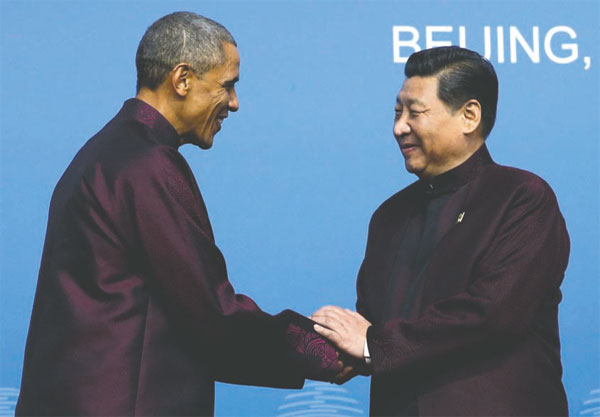2014 ends on positive note for US, China
By Chen Weihua (China Daily USA) Updated: 2015-01-02 10:58
The year ends, experts see huge potential in China-US relations, but thorny issues ranging from cyber security and maritime disputes to arms sales to Taiwan stand in the way of improving the complex relationship, CHEN WEIHUA reports from Washington.
For observers who have witnessed the often bumpy and sometimes roller coaster rides in the 35 years of diplomatic ties between China and the United States, many applauded that the increasingly complex relationship ended in 2014 on a positive note.
The mood looked somewhat somber in the first half of 2014. Headlines were dominated by heightened tensions over maritime territorial disputes in the South and East China seas and disputes in the cyber domain.
That mood started to lighten up in the second half, especially after US President Barack Obama and Chinese President Xi Jinping met in Beijing in November to announce a long list of cooperative agreements from carbon reduction to visa extension.
"President Obama's visit to China and attending the APEC leaders' summit in Beijing has pushed the bilateral relationship to a climax," said Cheng Li, director of the John L. Thornton China Center of the Washington-based Brookings Institution.
Shen Dingli, a professor and associate dean at the Institute of International Studies of Shanghai-based Fudan University, agreed. He described the Xi-Obama summit and the release of their joint statement on climate change, a bilateral notification mechanism on major military actions and a code of conduct for military encounters on the high sea as highlights of China-US relations in 2014.
- Sino-US ties set to be modified, diplomat says
- Year of cooperation marks US, China relations
- US rejects China involvement in Sony cyberattack
- Stiglitz has harsh words for US policymakers on China
- US arms sales to Taiwan protested
- China-US talks on trade, commerce conclude with fruitful outcomes
- China, US vow to boost tourism
- US urged to treat China with 'strategic foresight'
 Overhauling China's organ transplant system could take some time
Overhauling China's organ transplant system could take some time
Overhauling China's organ transplant system could take some time






